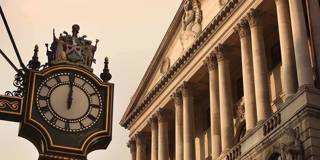Involving central banks in allocating money on the basis of “greening” compels them to make political decisions for which governments should be held accountable. The UK government’s new climate remit for the Bank of England is thus a further step in its abdication of responsibility for ensuring a healthy, sustainable economy.
ATHENS – In his March budget, the United Kingdom’s chancellor of the exchequer, Rishi Sunak, enlarged the mandate of the Bank of England to include supporting the government’s target of achieving net-zero greenhouse-gas emissions by 2050. But in a June 8 letter to the Financial Times, Mervyn King, a former BOE governor, was sharply critical of the move. King warned that “an expansion of central bank mandates into political areas such as climate change […] threaten[s] to weaken de facto central bank independence, leading to a slow response to signs of higher inflation.” So, what is going on?

ATHENS – In his March budget, the United Kingdom’s chancellor of the exchequer, Rishi Sunak, enlarged the mandate of the Bank of England to include supporting the government’s target of achieving net-zero greenhouse-gas emissions by 2050. But in a June 8 letter to the Financial Times, Mervyn King, a former BOE governor, was sharply critical of the move. King warned that “an expansion of central bank mandates into political areas such as climate change […] threaten[s] to weaken de facto central bank independence, leading to a slow response to signs of higher inflation.” So, what is going on?